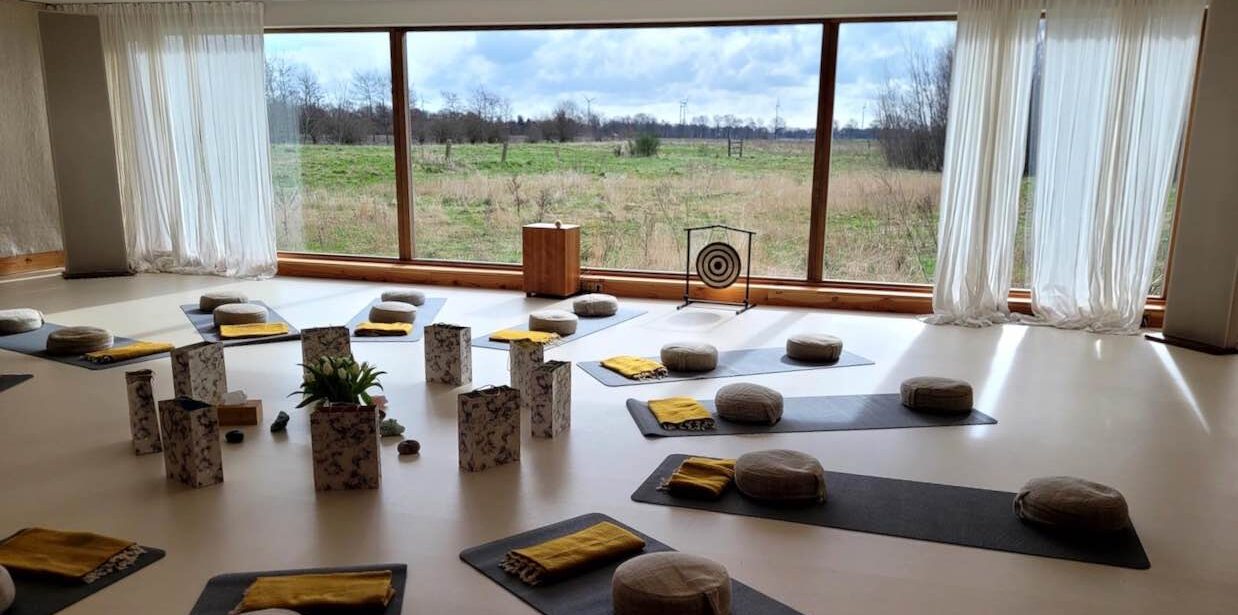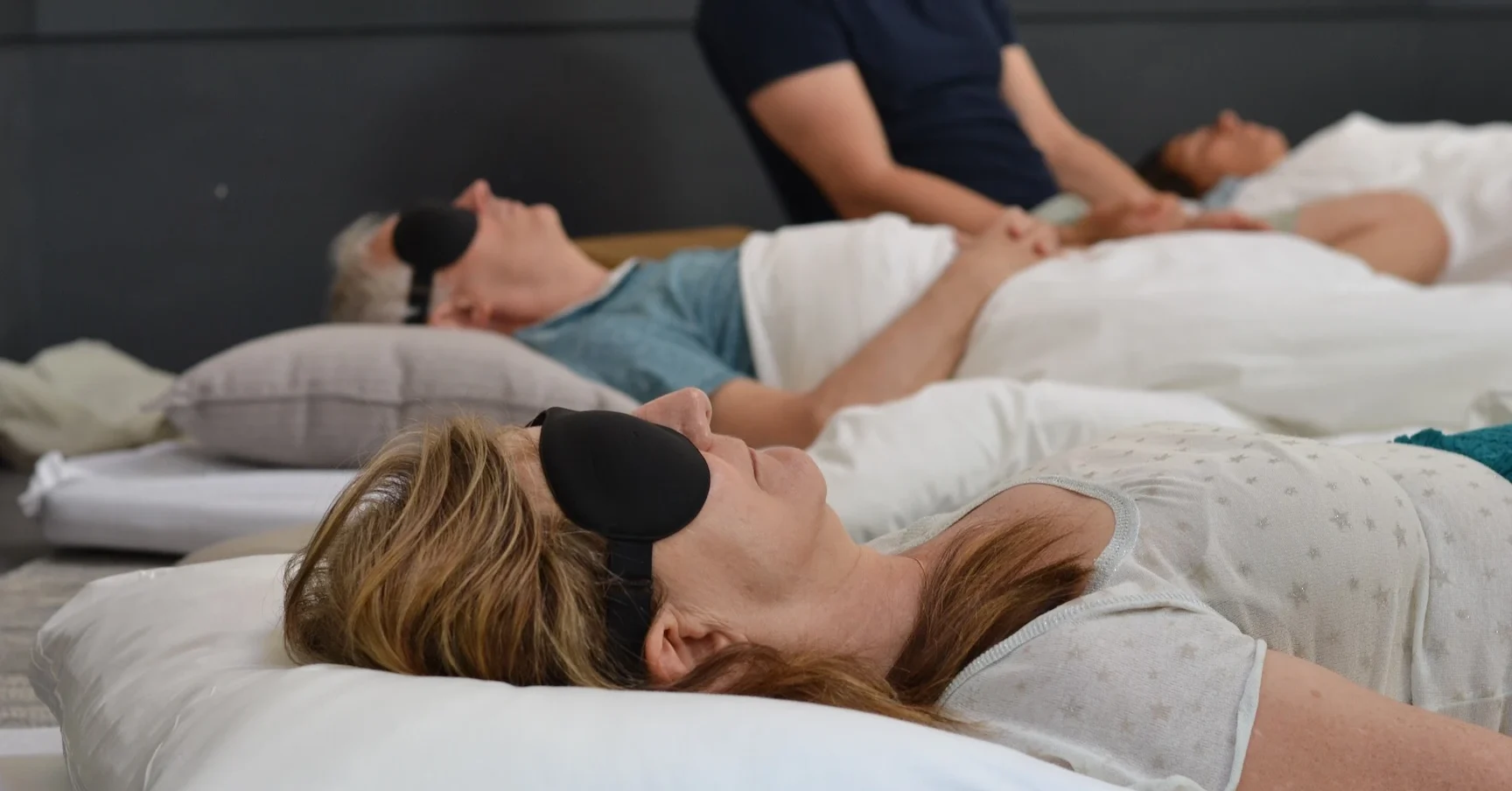Dmitrij Achelrod PhD
Dmitrij Achelrod PhD
In recent years, psychedelics have gained significant attention as a potential tool for mental health and self-exploration. Once mostly associated with counter-culture, these substances are now being seriously considered for their therapeutic value as well as for spiritual anthe md growth-focused explorations in non-clinical settings. However, with this renewed interest comes a crucial question: What’s the best way to experience psychedelics? Is it better to do it alone, with the guidance of a personal facilitator, or as part of a group retreat?
This article aims to tackle this question, providing insights for anyone, whether you’re experienced with psychedelics or just starting to explore their possibilities. By the end of this read, you’ll have a better understanding of which setting – solo, one-on-one, or group – might be the best fit for your needs and preferences. We’re here to help you make an informed decision about your psychedelic journey, one that feels right for you. Please bear in mind that we do not provide medical advice and you should always seek assistance from a medical professional before making any decision about consuming psychedelics. Let’s dive in.
1. Choosing the Right Setting for Your Psychedelic Journey is Crucial
At the heart of the psychedelic experience is its profound ability to enhance the meaning and depth of our perceptions and emotions. These substances, far from being mere hallucinogens, act as amplifiers of our internal reality construction and narratives, bringing to the surface thoughts, feelings, and insights that often remain hidden in our subconscious mind. This unique characteristic of psychedelics makes the setting in which they are taken an essential factor in shaping the experience.
Consider, for example, the impact of the environment and company when using psychedelics. In a serene, natural setting, a person might find themselves deeply connected to the environment, experiencing a sense of unity and harmony with nature. The chirping of birds or the rustling of leaves can take on profound significance, leading to a feeling of interconnectedness with the world. On the other hand, in a crowded, noisy environment, the experience might feel overwhelming or disorienting, with each stimulus intensifying the sense of inner chaos and confusion.
The setting plays a crucial role, as it can either be a cocoon that nurtures your journey or a distraction that hinders it. This underscores the importance of carefully choosing the setting for your experience. It’s not just about the physical location, but also about the emotional and social context. Understanding that psychedelics amplify the characteristics of their environment and company can guide you in selecting a setting that aligns with your goals, needs and comfort levels, ensuring a more meaningful and enriching experience.
If you don’t feel like going in-depth into this article, here is a quick summary of the strengths and weaknesses of each individual type of setting.
1.1 Summary: The Pros and Cons of Solo Trips, One on One Sessions and Group Retreats
| Solo Trips | One-on-One Sessions (w/ therapist) | Group Retreats | |
| Autonomy and Control | Complete control over the environment and experience | Personalized attention and care | Shared experiences and collective energy |
| Self-Exploration | Unfiltered self-exploration | Therapeutic guidance | Supported self-exploration whilst learning from others’ experiences |
| Privacy | Absolute privacy and confidentiality (if no one knows where you source your substances) | Confidential setting, focused on individual needs | Less control over privacy, but privacy can be agreed upon in group and sharing is optional. A sense of community and camaraderie supports willingness to share. |
| Cost | Just the substance 😉 | Very expensive | Good ratio between cost and service and some providers offer income-dependent pricing. |
| External Support | Lack of immediate external support | Potential dependency on the facilitator | Professionals with diverse backgrounds available. Strong group container supports individual experience. |
| Safety Concerns | Safety risks without a sober sitter, especially at high doses | Power imbalance and crossing of boundaries | Lack of individual support in too large groups if too few or poorly skilled facilitators are present |
| Interpretation of Experience | Risk of misguided, self-referential interpretations | Lack of diversity in perspectives | Group may affect flow of personal experience. Guides support meaning-making. Some providers offer 1:1s before and after the experience. |
| Emotional Intensity | Potential for isolation or overwhelming emotions | Might be uncomfortable being witnessed by one sitter (being in the spotlight) | Not in the spotlight, attention is distributed. Depth of experience heavily dependent on facilitator skills and group composition (feeling of trust and safety) |
And here is an overview of suggestions which setting might be best suited for you.
1.2 Summary: What setting is best for my psychedelic experience?
| Factor / Setting | Solo Trips | One-on-One Sessions (w/ therapist) | Group Retreats |
| Seeking unstructured introspection and very experienced with psychedelics | ✔️ | ||
| Preference for autonomy and full control over the setting of the experience | ✔️ | ||
| First-time psychedelic user | ✔️ | ✔️ | |
| Seeking specific cultural or spiritual experiences | (✔️) | ✔️ | |
| Need for therapeutic healing and support | ✔️ | (✔️) | |
| Need for personalized guidance and support | ✔️ | ✔️ | |
| Experienced psychedelic user seeking new perspectives in a safe and professional support setting | (✔️) | ✔️ | |
| Desire for a sense of community and belonging (embarking on a journey together) | ✔️ | ||
| Looking for mutual support and learning from each other (experience sharing both as listener and sharer) | ✔️ | ||
| Ability to choose guides and conversation partners from a team of professionals that you resonate most with | ✔️ | ||
| Preference for privacy and confidentiality | ✔️ | ✔️ | (✔️)* |
* High-quality group retreats manage to combine 1-on-1-sessions with group sessions, thus giving each participant enough space to withdraw or to receive personal attention when needed. Sharing in group-settings is voluntary and in professional retreats there is an NDA signed by all participants and the rules of engagement (incl. confidentiality) are discussed and agreed upon beforehand.
2. The Solo Psychedelic Journey
2.1 What “Tripping” Alone Entails
Embarking on a solo psychedelic journey is akin to setting sail on a vast, uncharted ocean of the mind. The beauty and challenge is that you are both the captain and the sailor at the same time. In this setting, you have the autonomy to navigate your thoughts, emotions, and revelations without external influence. In a solo journey, you have the freedom to let your experience unfold naturally, following the rhythm of your mind and body. Without the presence of others, your inner dialogue and experience becomes the only focus. It’s an experience that provides the ultimate personal space, free from the expectations or reactions of others.
When you take psychedelics alone, you can create an environment tailored to your comfort and preferences. This could mean choosing a familiar and safe space, like your living-room couch or your personal meditation spot at home, where you control elements like lighting, music, and overall ambiance.
Having said that, this type of journeying can be extremely challenging. The absence of a guide or companion means you must be prepared to face whatever surfaces, relying on your own resources to navigate through difficult or intense moments. It’s essential to have enough inner psychological resources and a plan for how to deal with challenging thoughts or emotions that may arise. This requires a high degree of mental preparation and resilience.
What’s more, in case there is a disturbance (someone ringing at the door, or something extreme like a fire in the building etc.) you might be quite vulnerable and overwhelmed. Your physical safety can be at risk if you develop paranoia or think you could fly or dive or swim when you can’t.
If you wish to better understand the possible dark side of a psychedelic experience, see our article Psychedelic “Bad Trip”: The Paradoxical Dark Side of Psychedelics.
2.2 Pros and Cons of “Tripping” Alone
Pros
- Complete Control Over the Experience: In a solo journey, you have the autonomy to tailor every aspect of the setting to your liking, from the music to the level of light. This personalization can enhance comfort and security, with fewer distractions.
- Unfiltered Self-Exploration: Without the presence of others, you’re more likely to delve into deeper levels of self-referential reflection. This unbridled introspection can lead to profound personal insights.
- Privacy and Confidentiality: A solo journey ensures absolute privacy, allowing you to explore sensitive or deeply personal themes without concern for external judgment or interruption.
Cons
- Lack of External Support: Without a facilitator or companion, handling intense emotions or challenging thoughts that arise can be daunting. This lack of immediate support can potentially lead to a difficult experience. Especially for those new to psychedelics, this overwhelm might trigger a spiral of fear that leads to a state of panic and potentially counterproductive solution-seeking (e.g. taking anxiolytics or physically leaving our safe space to seek help).
- Safety Concerns: In the absence of a sober sitter or guide, physical safety can be a concern. Ensuring a safe environment and having a plan in case of emergencies is crucial. You need to have plenty of experience with psychedelics, ideally including challenging trips, so you already have an idea about how you react when things get tough.
- Potential for Misguided Interpretations: Solo journeys lack the external perspective that a facilitator or therapist can provide. This might lead to unhelpful interpretations of the experience or missed opportunities for therapeutic insights. Our interpretations might be self-referential and we are limited to what we know and can understand. We can’t benefit from the wisdom of others who have gone through similar processes. For instance, some people develop the “Messiah complex”, thinking they received unique and secret insights from Jesus, God or some other holy being that only they and no other human have access to. While many people indeed have a profound spiritual experience under psychedelics, the art is to integrate it carefully into one’s life in an empowering and humble way. Instead of thinking that I am now the Chosen One, which will likely lead to self-isolation and detachment from reality, receiving guidance on my interpretation could help me establish deeper bonds with the sacred without losing groundedness.
- Isolation Risks: For some, the isolation of a solo journey might exacerbate feelings of loneliness or disconnection, particularly if the experience becomes challenging. It is important to understand that many, if not almost all, of our wounds are of relational nature, i.e. they happen in relationships with other people. This is why tending and healing these wounds usually requires another person that can give us what we might have needed back then when we were wounded in the first place, e.g. offering us a comforting gesture like a hug or holding one’s hand when we need to be reassured that we are not alone.
- Missing Out On The Transformational Impact: The deepest and most sustainable impact of a psychedelic journey might happen in the days after the psychedelic experience (not during!), when we meet a trusted, welcoming and attuned group as well as expert facilitators and coaches and interact with them in new ways, making new emotional and relational reference experiences (see the groundbreaking research on social criticality). If we are alone, we might miss out on precisely what might be the crucial developmental or integrative experience for us. Or, worse, we might be shaken and re-traumatized if we are surrounded by harsh, unattuned people around us in the days after the psychedelic experience – it might reinforce a pattern of disconnectedness and misattunement with the world, leading to more isolationist tendencies.
3. The One-on-One Psychedelic Session
3.1 Do I need a trip sitter?
Due to the psychological and physiological safety risks of a solo psychedelic experience, especially for a relatively inexperienced (less than 10 psychedelic experiences) individual, the role of a ‘trip sitter’ emerges as an important consideration.
A trip sitter is a trusted and sober individual who accompanies someone through their psychedelic experience, ensuring their safety and providing a supportive presence. A casual trip sitter primarily focuses on creating a safe environment, maintaining a calm and supportive presence, and being vigilant to the needs of the individual under the influence.
This support can include practical aspects like managing the environment to enhance the experience, ensuring hydration and comfort, preventing the individual from unintended physical self-harm, and offering emotional support if intense feelings arise. Ideally, trip sitters often possess a good understanding of the substance being used and adhere to ethical principles like non-judgment, confidentiality, and compassionate listening. While they are not guiding the experience, their presence affects the person who is in a highly vulnerable and receptive state. Although in most cases it is safer to have a trip sitter than undergo a journey solo, it does not mean that your best friend or partner will be the optimal person to be there with you. A psychedelic experience can have unpredictable moments where a trip sitter, unlike a personal therapist or professional facilitator who has training and experience in psychedelic-assisted therapy, will not have the ability to intervene appropriately in these key moments to steer the experience to a safe place.
3.2 The Role of a Personal Facilitator
In a one-on-one psychedelic session, the presence of a personal facilitator can dramatically transform the experience. A good facilitator is not just a guide; they are a compassionate and selfless presence, a skilled navigator, and a supportive ally, all rolled into one. Their role is multifaceted, focusing on creating a safe and nurturing environment, offering emotional support, and helping to contextualize the experience both during and after the session.
So what are the characteristics and tasks of a professional psychedelic facilitator?
Creating a Safe and Trustworthy Environment
The facilitator’s primary responsibility is to ensure the safety and comfort of the individual. This involves preparing a setting that is conducive to a positive and introspective journey. They work closely with the individual to understand their needs, preferences, and apprehensions, adjusting the environment accordingly.
Emotional Support and Guidance
During the session, the facilitator remains present and attentive, offering emotional support and reassurance. They are trained to recognize and respond to the varied emotional states that can arise, providing a calming presence that can be particularly crucial during moments of vulnerability or intense revelation.
Navigating the Psychedelic Experience
A facilitator helps in navigating the psychedelic experience. They are skilled at guiding the flow of the session, gently steering the individual through different phases of the experience, and helping them stay anchored if the journey becomes challenging.
Expertise in Psychedelic Therapy
For clinical applications, e.g. for the treatment of PTSD, depression or anxiety disorders, facilitators come with specialized training in psychedelic therapy (e.g. our Evolute facilitator Naomi was trained by MAPS, the leading organization for psychedelic-assisted therapy training). This expertise includes an understanding of the pharmacological aspects of psychedelics, knowledge of psychological theories relevant to psychedelic experiences, and skills in therapeutic techniques that are effective in these unique settings.
Post-Session Integration
Perhaps one of the most crucial roles of a facilitator is assisting with the integration of the psychedelic experience into the individual’s daily life. Post-session discussions and debriefings are essential for making sense of the insights gained and applying them in a constructive and meaningful way.
3.3 Pros and Cons of the One-on-One Psychedelic Session
Pros:
- Personalized Attention and Care: In a one-on-one setting, the facilitator’s focus is entirely on the individual. This personalized attention ensures that the session is tailored to meet the specific emotional and psychological needs of the person, providing a customized experience.
- Enhanced Safety and Support: The presence of a trained facilitator significantly increases the safety of the psychedelic experience. They are equipped to handle any challenging emotional or psychological states that may arise, offering immediate support and intervention if needed.
- Facilitated Integration: The facilitator plays a vital role in helping individuals process and integrate their experiences. This ongoing support can be crucial in translating insights from the psychedelic journey into meaningful life changes.
- A Clinical Therapeutic Experience: For those seeking therapeutic outcomes, a one-on-one session with a facilitator can offer a structured and guided therapeutic experience. The facilitator’s expertise in psychotherapy can help direct the session towards areas of disease treatment and healing.
Cons:
- Limited Perspectives: While facilitators offer valuable guidance, their interpretations and insights may sometimes overshadow the individual’s own understanding of their experience. This can potentially limit the personal interpretation and self-discovery aspect of the journey. For instance, while many people taking part in psychedelic clinical studies attribute a great importance to their spiritual experience, most clinical therapists are taught to not give these experiences too much attention (spiritual encounters are considered a side effect, at best, and a nuisance and distraction from healing at worst)
- Dependency Risk: There is a potential risk of becoming overly dependent on the facilitator, especially if individuals feel they cannot navigate the psychedelic experience without guided support. There is a fine line between supporting a person and disempowering her. The facilitator should not turn into the healer who does all the healing – this would put the journeyer into a passive and dependent position. Phrases like ‘I know exactly what you need, better than you do yourself!’ or “I have special messages for you” are clear red flags.[1]
- Power Dynamics: The person who is under the influence of psychedelics will be extremely vulnerable for several hours and in that sense exposed to the facilitator. There must be very clear and explicit ethical standards with regards to respecting personal boundaries (like physical touch). Unfortunately, there have been cases in the past where even high-profile facilitators exploited their power and crossed several boundaries, harming their patients (for example here)
- Cost and Accessibility: One-on-one sessions are expensive and may not be accessible to most people. The cost of a trained facilitator, along with the setting and other preparations, can be prohibitive. Most one-on-one sessions take just 6 to 8 hours, but it would be a lot more beneficial to take substantially more time with preparation and integration (at least 2 days). However, almost no one could afford a longer, multi-day process with a personal facilitator.
4. Group Psychedelic Retreats
4.1 Group Dynamics in Psychedelic Retreats
Group psychedelic retreats offer a distinctive setting where individuals come together to explore their consciousness in a shared space. Here are some characteristics of good psychedelic group retreats.
Community-Centric Setting:
The heart of a group retreat lies in the sense of community it cultivates. Participants are often brought together in a tranquil, secluded environment, conducive to introspection and communal interaction. A high-quality retreat has a full private retreat center – ideally in nature – at its disposition and accompanies its participants over several days. This setting allows individuals to feel part of a supportive network, sharing a common purpose and journey, and leaving ample time for conversations with fellow travelers and guides.

Shared Experiences:
In a group retreat, participants embark on their psychedelic journeys simultaneously. In the Evolute Institute, for example, people lie down in a ceremonial hall on their own comfortable mats and receive an eye mask, so that the journey goes inwards. The group dynamic in these retreats is not just about sharing a physical space; it’s about sharing energy and intention as well as the music being played. This collective energy can significantly influence the individual experience, offering a sense of unity, support and connection that might be harder to achieve in solo settings and that allows for each person’s nervous system to relax deeper into the experience.The shared nature of the experience often leads to a sense of solidarity and connectedness among participants, exposing our shared human condition. The sharing of the experience afterwards is often perceived as deeply touching and enriching – each journey is unique and yet we find elements of our journey in many of the others’ experiences. The extensive relating taking place before, during and after the psychedelic ceremony is an important part of the personal integration, growth and development of each person – more than might be obvious for first-time travelers who might assume it’s mostly about the psychoactive substance. It has been our experience time and again that instead it’s more about the new experiences of embodiment, introspection and relating we make around the psychedelic journey itself which has the largest and most long-lasting impact on people’s lives.
Structured Group Activities:
Most group retreats include structured activities like group discussions, meditation or yoga sessions, and other preparatory and integrative practices. These activities are designed to deepen the psychedelic experience, helping participants to process and integrate their experiences both individually and as a group. Leading providers like Evolute Institute have an actual development-oriented curriculum, evidence-based content and advanced Gestalt or similar practices, plus interactive lectures around vertical development, leadership, integration, or insights from wisdom traditions.
Facilitator-Guided Sessions:
Group retreats are typically led by one or more facilitators who guide the overall experience. These facilitators ensure a safe environment, lead group activities, and provide support during the psychedelic sessions. The best retreat centers have a facilitator-to-participant ratio of (1:2) and facilitators bring in diverse skills and experience, e.g. medical doctors, psychologists, ceremonial guides, somatic therapists and integration experts.
Balancing Individual and Collective Needs:
A key aspect of good group retreats is balancing the individual journey with the collective experience. Facilitators and the retreat structure aim to honor each person’s personal journey while fostering a shared space where everyone feels connected and supported. Leading retreat programs like EvoLEAD offer highly customized development journeys with four 1:1 coaching sessions throughout their programs, plus all the group-based experiential content and formats.
4.2 Pros and Cons of Group Psychedelic Retreats
Pros:
- Deep Sense of Belonging: One of the main advantages of group retreats is the supportive environment they foster. Participants often find comfort and encouragement in the shared experiences of their peers. It’s often in the stories of others that we see and find ourselves – we feel that we truly belong. This shared energy creates a unique sense of unity and interconnectedness. The support of others allows us to touch deep places that we couldn’t do on our own. Psychedelic researchers speak of “communitas” which is defined as “intense togetherness and shared humanity that temporarily transcends social structures.” A study found that communitas during ceremony was significantly correlated with increases in psychological wellbeing and other salient mental health outcomes.[2]
- Mastering challenging experiences: Research indicates that being accompanied in a group reduces the likelihood of challenging experiences during a psychedelic trip. [3] When people feel more comfortable and connected with their environment, they usually reap more benefits from the psychedelic experience.
- Mirroring and Modeling Behaviors: Group settings allow for mirroring and modeling of behaviors, such as vulnerability and openness. Seeing others engage in deep introspection or express emotions can encourage similar behavior, creating a safe space for all participants to open up.[4], [5]
- Diverse Facilitator Teams: Group retreats often benefit from having diverse facilitator teams, including medical doctors, psychologists, and coaches. This variety ensures a well-rounded approach to guidance and support, catering to the varied needs of participants.
- Maximum safety: Good psychedelic group retreats can afford to have a medical doctor on-site in addition to skilled facilitators – this is usually very rarely the case with one-on-one sessions. Moreover, high-quality retreat providers have a team of 4-5 people present during the ceremony with a group of 8-10 people, so that always at least 3 facilitators in the room during the psychedelic journey, so that the space is well-held at all times (even when for example 1-2 facilitators step outside for a moment in order to accompany participants to the toilet or are on break). This is also a way to avoid power abuse (in contrast to one-on-one sessions where the power of the facilitator is basically unchecked).
- Learning from Others: Group settings allow for the sharing of experiences and insights, which can be a profound learning opportunity. Hearing about others’ journeys can provide different perspectives and insights that might not emerge in a solo or one-on-one setting. This communal sharing can be particularly enlightening, as it showcases the diverse ways in which psychedelics can impact individuals.
Cons:
- Peer Pressure: If not expertly facilitated, group dynamics can lead to negative experiences like peer pressure or the influence of dominant personalities. This can detract from the individual’s personal journey and lead to discomfort or conformity. A careful selection of participants is required as well as great facilitation skills of the group leaders and guides.
- Privacy Concerns: In a group setting, privacy can be limited. Sharing personal experiences in a group can be daunting for some. A factor that distinguishes outstanding retreats from mediocre ones is when a carefully crafted “safe container” allows participants to open up fully, to a degree that often even surprises the participants themselves. This needs time and facilitation skills, so programs that make the effort to create such a group synchronization are usually longer, for example 3 weeks of prep work, 4 days on-site and 2 months of integration in the case of Evolute Institute’s EvoLEAD program.
- Group Size Issues: The size of the group can impact the quality of the experience. Large groups (>12 people) may lead to a lack of individual attention from facilitators and group fragmentation, diluting the personalized guidance and the trust in the group that can be crucial for a profound psychedelic experience. This is why we at Evolute Institute believe it’s crucial to keep the group small and intimate, limiting the number of participants to max. 12 people, more often 8-10 people.
- Dependence on Facilitator Skills: The quality of the group retreat heavily relies on the ability and skills of the facilitators. Expert facilitation is crucial to manage the group dynamics effectively, ensure safety, and provide meaningful guidance. Inexperienced or inadequate facilitation can significantly compromise the experience and reduce the impact on personal growth and development In borderline cases negligent, insensitive or overbearing behavior by staff can even harm people and have a traumatizing effect on them.
5. Choosing the Right Setting for Your Psychedelic Journey
Here, we explore key aspects to consider when choosing between a solo journey, a one-on-one session, or a group retreat.
5.1 Questions You Should Ask Yourself
- Personal Goals: What do you hope to achieve from your psychedelic experience? Are you seeking curious exploration, therapeutic healing, or a sense of community and shared experience? A solo journey might be more suited for unstructured exploration, while a one-on-one setting can be ideal for therapeutic purposes. Group retreats often cater to those seeking personal development and shared experiences and learning from others whilst having professional support.
- Mental Health History: What is your mental health like? Your mental health history is a vital factor in this decision. If you have a history of mental health conditions, e.g. clinical depression, professional guidance in a one-on-one setting is advisable. Solo journeys can be risky for those with such backgrounds and for anyone without ample psychedelic experience. Group retreats can be great for personal growth, embracing and letting go of psychological wounds as well as spiritual explorations, but not for clinical therapy.
- Comfort Levels with Psychedelics: How much experience do you have with psychedelics? Your familiarity and comfort level with psychedelics play a significant role. Beginners might find the structured support of a group retreat or the guided safety of a one-on-one session more reassuring. Very experienced individuals might prefer the autonomy of a solo journey.
- Safety and Setting: How are you going to take care of your safety and support? Safety should be a priority in your decision. Consider which setting offers the safety and support you need. This includes not just physical safety but also emotional and psychological safety. A controlled environment is crucial, especially if you are new to psychedelics or have had challenging experiences in the past. Group retreats can offer very high safety standards because they can bring in professionals from different disciplines to ensure all aspects are covered.
- Level of Professionalism: How professional and trustworthy are the facilitators? What is the background of the facilitators? Do they have relevant training and experience? You should watch out for indicators that the entire organization is run professionally, with clear standards and quality criteria, from the physical place of the retreat center down to the behavior and presence of the facilitator team. Do you feel that the facilitators can attune to you?
- Personal Preferences for Setting: What are my personal preferences? Reflect on your preference for solitude versus social interaction. Do you feel more comfortable in a private, controlled setting, or do you thrive in the energy of a group? Your personal inclination towards either solitude or social settings can significantly impact your experience. At the same time, when you have a very strong opinion about how the journey must look like (e.g. “I’m definitely not doing this in a group”), this might be an indication that you are trying to avoid something, e.g. you find it difficult to open up in front of other people and hence you (unconsciously) choose the path of least resistance instead of going out of your comfort zone.
- Accessibility and Practical Considerations: Finally, consider practical aspects such as the availability of facilitators, the location of group retreats, and the financial and time investment required for each option. These logistical details, while seemingly minor, can affect your overall experience and the feasibility of your choice.
5.2 Recommendations for Different Needs
Here, we offer suggestions based on various individual preferences and objectives, helping you choose the setting that best aligns with your personal psychedelic journey.
- For Unstructured Journeying:
- If your primary goal is self-exploration without clear structures, a solo journey might be the most suitable.
- Ensure that you are very experienced with psychedelics and have a safe, familiar setting. Prepare a plan for managing challenging emotions or thoughts that might arise.
- If your primary goal is self-exploration without clear structures, a solo journey might be the most suitable.
- For Therapeutic Treatments:
- Individuals seeking therapeutic outcomes, particularly those dealing with specific mental health issues, may benefit most from a one-on-one session with a trained psychedelic therapist, although psychedelic group-therapy is also being scientifically evaluated.[6]
- The therapist’s expertise in psychotherapy can provide a structured and guided experience, focusing on therapeutic goals and emotional healing.
- For Personal Development, a Sense of Community and Shared Experiences:
- If you are drawn to the idea of shared energy and learning from others’ experiences, a group psychedelic retreat is a fitting choice.
- These settings offer a sense of camaraderie and collective exploration, ideal for those who find comfort and insight in shared journeys while also having time for personal reflection and time alone. Evolute Institute for example offers private rooms as part of their EvoLEAD program so you can retire at any time to the comfort of your private space.
- A large and diverse facilitator team can allow you to seek guidance and have meaningful conversations or coaching sessions with different facilitators and you can seek support from those you resonate most with, and from different people at different times.
- If you are drawn to the idea of shared energy and learning from others’ experiences, a group psychedelic retreat is a fitting choice.
- For First-Time Psychedelic Users:
- Beginners are often advised to start with a guided setting, either one-on-one or in a group retreat. The presence of experienced facilitators can provide reassurance and guidance, making the initial experience less daunting.
- Group retreats can also offer a gentle but deep introduction to psychedelics, with the added benefit of peer support and shared experiences.
- Beginners are often advised to start with a guided setting, either one-on-one or in a group retreat. The presence of experienced facilitators can provide reassurance and guidance, making the initial experience less daunting.
- For Experienced Psychedelic Users Seeking New Perspectives:
- If you have considerable experience with psychedelics and are looking to explore new dimensions or perspectives, alternating between different settings could be enlightening. A well held group space in a trusted group container and with expert support might allow you to go much deeper in your journey – our nervous systems are pretty smart and know when it’s safe to fully let go and when it’s better to retain some control.
- Engaging in both solo and group experiences, for example, can offer contrasting insights and a more rounded understanding of your psychedelic experiences.
- If you have considerable experience with psychedelics and are looking to explore new dimensions or perspectives, alternating between different settings could be enlightening. A well held group space in a trusted group container and with expert support might allow you to go much deeper in your journey – our nervous systems are pretty smart and know when it’s safe to fully let go and when it’s better to retain some control.
- For Those with Specific Spiritual, Cultural or Programmatic Interests:
- If your interest in psychedelics is tied to specific spiritual practices or cultural traditions, seek out settings or facilitators that specialize in these areas.
- Group retreats often offer thematic experiences that align with particular spiritual or cultural practices, providing a more targeted and meaningful experience.
- For professionals and organizational leaders also a professional leadership experience retreat like EvoLEAD by Evolute Institute might be a great fit. Here you meet fellow entrepreneurs, change-makers and leaders and build your network while enjoying the quality of a highly professional curriculum.
- If your interest in psychedelics is tied to specific spiritual practices or cultural traditions, seek out settings or facilitators that specialize in these areas.
6. Conclusion
In conclusion, while the solo psychedelic journey offers a lot of control over the setting, it requires careful consideration of one’s mental preparedness, the setting, and safety measures. It’s only suited for those who are experienced with psychedelics and comfortable navigating their inner world independently. For beginners or those with unresolved deeper psychological issues, seeking professional guidance or considering other settings is definitely more advisable. Traveling solo might leave you in a hall of mirrors with your own thoughts, not necessarily promoting deeper introspection, and re-experiencing difficult past experiences or other experiences from the individual or collective unconscious might be deeply disturbing or even traumatizing when being unsupported and alone
One-on-one guided psychedelic sessions offer a high degree of personalization and safety, but they also come with certain limitations related to cost, lack of diversity, the risk of dependency and unbalanced power dynamics.
Group psychedelic retreats offer a unique and communal approach to psychedelic experiences. The pros of such settings include a supportive environment with peer support, collective energy, behavior modeling, and diverse facilitator teams. However, potential cons like complex group dynamics and privacy concerns must be considered. The success and quality of these retreats are highly contingent on the expertise and ability of the facilitators to create a balanced, safe, and enriching experience for all participants.
Selecting the right setting for a psychedelic experience is a critical decision that can significantly influence the outcome of the journey. It’s not a one-size-fits-all scenario; rather, it requires thoughtful consideration of several personal factors. We hope that this article provided some helpful information for your choice. In the end, don’t forget to also listen to your intuition and see what feels right for you at this moment.

Dr. Dmitrij Achelrod,
co-founder Evolute Institute
Is a group retreat program right for your personal growth journey?
We invite you to schedule a call with us. Together, we can explore any questions or concerns you may have. We can explore whether this program is right for you at this time and ensure you feel confident about and ready to embrace this transformative experience.
“We are here to support your exploration, at your pace, with no expectations.” – Dmitrij Achelrod
Bibliography
[1] Z. Shechtman and A. Kiezel, ‘Why Do People Prefer Individual Therapy Over Group Therapy?’, Int. J. Group Psychother., vol. 66, no. 4, pp. 571–591, Oct. 2016, doi: 10.1080/00207284.2016.1180042.
[2] H. Kettner, F. E. Rosas, C. Timmermann, L. Kärtner, R. L. Carhart-Harris, and L. Roseman, ‘Psychedelic Communitas: Intersubjective Experience During Psychedelic Group Sessions Predicts Enduring Changes in Psychological Wellbeing and Social Connectedness’, Front. Pharmacol., vol. 12, 2021, Accessed: Dec. 29, 2023. [Online]. Available: https://www.frontiersin.org/articles/10.3389/fphar.2021.623985
[3] E. C. H. M. Haijen et al., ‘Predicting Responses to Psychedelics: A Prospective Study’, Front. Pharmacol., vol. 9, p. 897, Nov. 2018, doi: 10.3389/fphar.2018.00897.
[4] P. Ponomarenko, F. Seragnoli, A. Calder, P. Oehen, and G. Hasler, ‘Can psychedelics enhance group psychotherapy? A discussion on the therapeutic factors’, J. Psychopharmacol. Oxf. Engl., vol. 37, no. 7, pp. 660–678, Jul. 2023, doi: 10.1177/02698811231155117.
[5] B. R. Lewis, K. Byrne, J. Hendrick, E. L. Garland, P. Thielking, and A. Beck, ‘Group format psychedelic-assisted therapy interventions: Observations and impressions from the HOPE trial’, J. Psychedelic Stud., vol. 7, no. 1, pp. 1–11, Jan. 2023, doi: 10.1556/2054.2022.00222.
[6] A. Trope, B. T. Anderson, A. R. Hooker, G. Glick, C. Stauffer, and J. D. Woolley, ‘Psychedelic-Assisted Group Therapy: A Systematic Review’, J. Psychoactive Drugs, vol. 51, no. 2, pp. 174–188, Mar. 2019, doi: 10.1080/02791072.2019.1593559.









